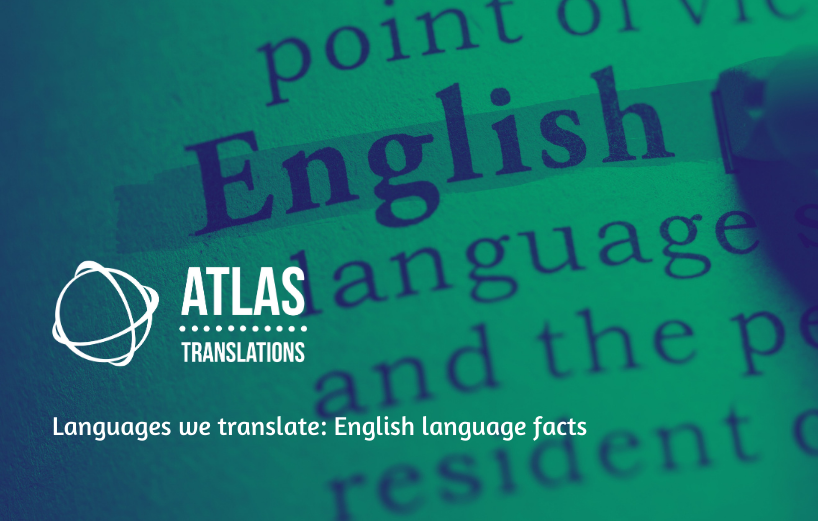Languages we translate: English language facts

Being a UK translation agency, it’s no surprise that English is the language we tend to work with most often. The majority of our clients require translation or interpreting services either from or into English, so we thought it’s a good idea to give English some attention on our blog. Let’s have look at some English language facts!
One of the most spoken languages in the world
It won’t be news to you that English is among the most spoken languages in the world, but did you realise that it has the largest number of non-native speakers? This makes it the most spoken language in the world despite having fewer native speakers than Chinese or Spanish. English is also one of the 6 official languages of the United Nations.
Why the English language is universal
In the last century, English has become the international language of the world, particularly in business, science, technology, and civil aviation. There’s even “Aviation English”, the language of the skies. Unsurprisingly, English also leads in the digital world – most of the available web content is in English.
How did it get to that point? Several factors contributed to the English language’s current status on the international scene. The period of the British Empire and colonisation introduced English to many parts of the world. In addition, the widespread presence of American films and music in the 20th century, as well as the US dominance in technology, contributed to its popularity.
Which countries speak English?
When thinking of English, most people tend to divide it into American and British variants, but there are many more. In fact, English is an official language in more than 50 countries! Apart from the United Kingdom, the United States, Australia, Canada, Ireland and New Zealand, it is spoken in countries like Bahamas, Jamaica, Barbados, Grenada, Trinidad and Tobago, and Guyana. In addition, English is one of the official languages in many other countries, for example Botswana, India, Ghana, Malta, Rwanda, Uganda, Zimbabwe, and Sierra Leone.
How it all began…
English is a Germanic language and likely started in the 5th century with the Anglo-Saxon invasion. The arrival of Germanic tribes to Britain replaced the previously spoken Celtic language. It is believed that English owes its name to the Angles tribe, whose name in Old English was “Engle”.
Old English
In the early days, English used the runic alphabet which was gradually replaced with the Latin alphabet after the arrival of Christian missionaries. Old English used to have a much freer word order than Modern English, as well as inflections. The most popular example of Old English is the poem Beowulf:

Looks quite different from the English we know today, doesn’t it?
Middle English
After the Norman Conquest of 1066, English was highly influenced by French which became the language of the upper classes. That’s why today we can see many similarities across these two languages, despite the different pronunciation.
Between the 11th and 14th centuries – referred to as the period of Middle English – the language underwent many significant changes and formed the basis of Modern English spellings.
Modern English
It is accepted that Modern or New English has been spoken since the Great Vowel Shift, which began in the late 14th century. The works of William Shakespeare belong to the Early Modern English and according to many, had a big influence on Modern English and its standardisation. It is claimed that Shakespeare invented some 1,700 words! Among the words attributed to him are “bedroom”, “fashionable”, and “lonely”.
The first English dictionary was written in 1755 by Samuel Johnson while the period of British colonialism brought English to different corners of the world.
From borrower to trendsetter
English has loaned a lot of its vocabulary from other languages – Old Norse, French, Latin… In fact, it’s estimated that around 80% of its vocabulary is borrowed! Here are some words of foreign origin that are commonly used in English:
- Cuisine and Souvenir (French)
- Gratis (Latin)
- Safari (Arabic)
- Mosquito and Patio (Spanish)
- Cookie (Dutch)
- Wanderlust (German)
- Tsunami (Japanese)
- Metropolis and Kudos (Greek)
- Ketchup (Chinese)
- Penguin (Welsh)
- Kindergarten (German)
- Mammoth (Russian)
- Bagel (Yiddish)
Today, English is a big trendsetter. Due to its dominance in science, business, and technology, there are many new words created in English, which then tend to be used in other languages. Among them are, for example, “business”, “marketing”, “e-mail”, “blog”, and “link”.
English language for foreigners
Is English difficult to learn for foreigners? Depends on who you ask and your mother tongue. In general, it is often seen as a relatively easy language to learn. However, it can sometimes be infuriating with its contradictions, double meanings, and exceptions. Pronunciation is probably the most difficult aspect of the English language for non-native speakers. A lot has been said about English pronunciation, which, let’s be honest, is all over the place…
Many native English speakers don’t realise what a challenge it is for English learners! If someone wants to ensure they pronounce an English word correctly, they have to look it up – attempting to spontaneously read it is rarely successful. Our Project Managers Stefania and Joanna sure know the struggle!
If you want to check how strong your English pronunciation skills are, we encourage you to read this poem by Dr Gerard Nolst Trenité, fittingly called The Chaos. Good luck!
English and its contradictions
To make things just a bit more complicated for English learners, the language also has many contronyms – words, which depending on the context can have contradictory meanings. Here are some of them:
- Back up – 1) to retreat; 2) to support
- Overlook – 1) to fail to notice; 2) to look after, oversee
- Bolt – 1) to secure; 2) to flee
- Custom – 1) a common practice; 2) a special treatment
- Transparent – 1) invisible; 2) obvious
- Trip – 1) a journey; 2) to stumble
Needless to say, learning English can be a confusing journey. If you’re curious about translation into English from a non-native English speaker’s perspective, check out this blog written a few years ago by Carolina.
But doesn’t everyone speak English?
Based on the number of countries and speakers that use English and how significant it is in various fields, it is easy to assume that there’s no need to learn other languages or provide translations, because pretty much everyone speaks English…, right? That assumption would be wrong. Despite being spoken in many parts of the world, it is estimated that around 17% of the world’s population speak English, and only 6% are native speakers. These may be relatively high numbers, but mean that more than 80% of the global population speak languages other than English!
The importance of localisation
In order to respect diversity and offer the same opportunities around the world, it is important to provide people with information, educational materials and other communications in languages they can understand. Even if someone speaks a second language well, they may still prefer to communicate or read in their native tongue, especially when it relates to healthcare, finance, legal matters, or making purchases.
Many companies realise that exporting business to other markets demands adapting to those foreign markets. More attention is put on user experience, personalisation and respect for people’s cultures. That’s where localisation comes in. It makes connecting with local audiences possible and takes into consideration not only foreign languages, but also regional varieties.
You have likely noticed that some websites and apps have separate versions for the US and UK markets. You may think that it’s a bit excessive since people from both of these places could understand each other well. However, the content tends to resonate with them more if it is adapted to their background and uses their vocabulary. When localising the text, even details such as measurements and date or price formats matter. That’s why among our services you will also find Americanisation and Australianisation.
Translation services into or from English
Whether you need to translate your content from or into English, Atlas Translations can help. As a UK translation agency, we collaborate with many translators who work with English and specialise in different fields. It’s also important to note that we always work with translators who translate into their native language. If you have any translation enquiries, give us a call on 01727 812725 or email team@atlas-translations.co.uk.














